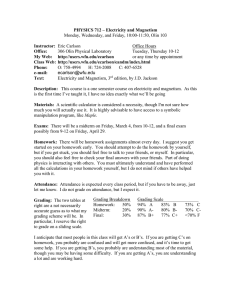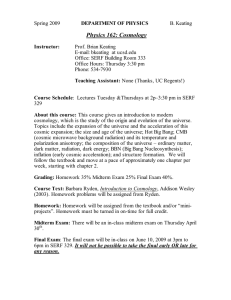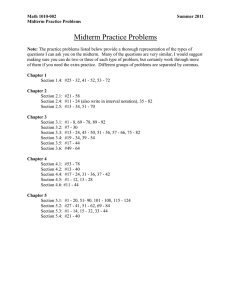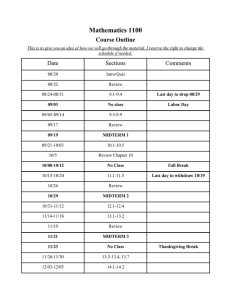PHYSICS 310 - Cosmology Instructor: Office: Monday, Wednesday, and Friday 2:00-2:50
advertisement
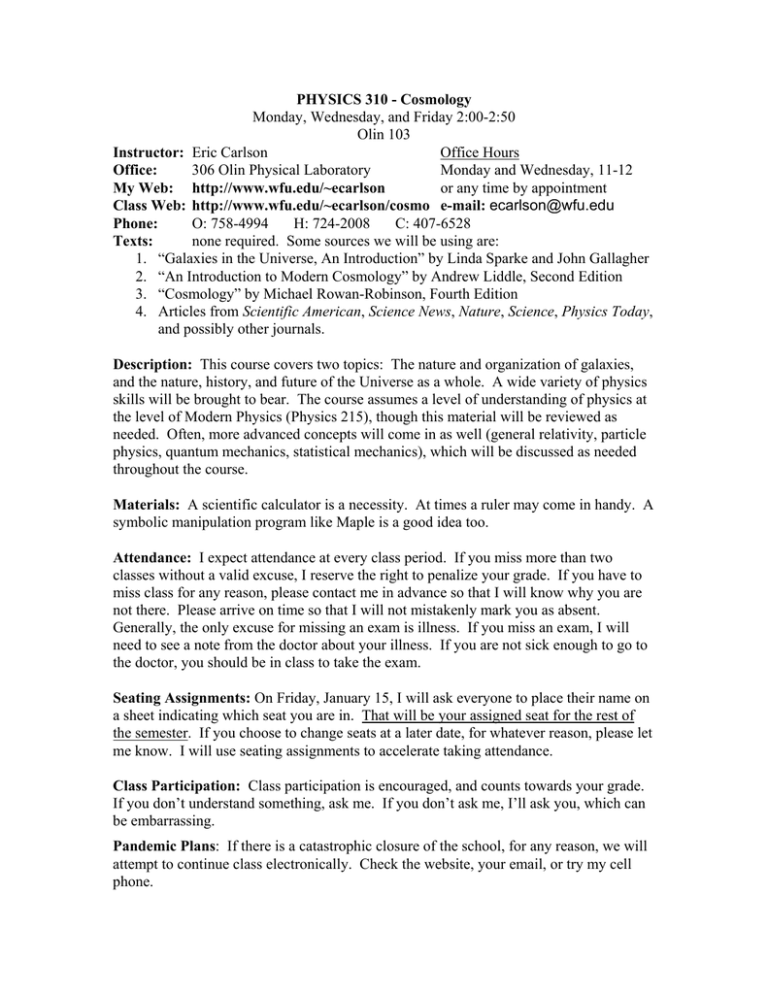
PHYSICS 310 - Cosmology Monday, Wednesday, and Friday 2:00-2:50 Olin 103 Instructor: Eric Carlson Office Hours Office: 306 Olin Physical Laboratory Monday and Wednesday, 11-12 My Web: http://www.wfu.edu/~ecarlson or any time by appointment Class Web: http://www.wfu.edu/~ecarlson/cosmo e-mail: ecarlson@wfu.edu Phone: O: 758-4994 H: 724-2008 C: 407-6528 Texts: none required. Some sources we will be using are: 1. “Galaxies in the Universe, An Introduction” by Linda Sparke and John Gallagher 2. “An Introduction to Modern Cosmology” by Andrew Liddle, Second Edition 3. “Cosmology” by Michael Rowan-Robinson, Fourth Edition 4. Articles from Scientific American, Science News, Nature, Science, Physics Today, and possibly other journals. Description: This course covers two topics: The nature and organization of galaxies, and the nature, history, and future of the Universe as a whole. A wide variety of physics skills will be brought to bear. The course assumes a level of understanding of physics at the level of Modern Physics (Physics 215), though this material will be reviewed as needed. Often, more advanced concepts will come in as well (general relativity, particle physics, quantum mechanics, statistical mechanics), which will be discussed as needed throughout the course. Materials: A scientific calculator is a necessity. At times a ruler may come in handy. A symbolic manipulation program like Maple is a good idea too. Attendance: I expect attendance at every class period. If you miss more than two classes without a valid excuse, I reserve the right to penalize your grade. If you have to miss class for any reason, please contact me in advance so that I will know why you are not there. Please arrive on time so that I will not mistakenly mark you as absent. Generally, the only excuse for missing an exam is illness. If you miss an exam, I will need to see a note from the doctor about your illness. If you are not sick enough to go to the doctor, you should be in class to take the exam. Seating Assignments: On Friday, January 15, I will ask everyone to place their name on a sheet indicating which seat you are in. That will be your assigned seat for the rest of the semester. If you choose to change seats at a later date, for whatever reason, please let me know. I will use seating assignments to accelerate taking attendance. Class Participation: Class participation is encouraged, and counts towards your grade. If you don’t understand something, ask me. If you don’t ask me, I’ll ask you, which can be embarrassing. Pandemic Plans: If there is a catastrophic closure of the school, for any reason, we will attempt to continue class electronically. Check the website, your email, or try my cell phone. Exams: There will be a midterm and a final. Both tests will include both quantitative and essay questions. You should bring a calculator on exam days. The midterm will be around March 3, and the final will be as scheduled on Friday April 30 at 2:00. If possible, I would like to schedule the midterm for two hours one evening in the first week of March Homework: Homework will occur regularly. It is to be done and turned in at the start of each class period. Homework will normally be posted on the web at least one week before it is due. You should attempt to do the homework by yourself, but if you get stuck, you should feel free to talk to your friends in the class, or myself. In particular, you should feel free to check your final answers with your friends. You must ultimately understand and have performed all the calculations in your homework yourself, but I do not mind if others have helped you with it. Grading Breakdown Grading Scale _______ Grading: The two tables at Homework: 40% 93% A 80% B- 67% D+ right are a not necessarily Midterm: 20% 90% A- 77% C+ 63% D accurate guess as to what my Class Part: 10% 87% B+ 73% C 60% Dgrading scheme will be. In Final: 30% 83% B 70% C- <60% F particular, I reserve the right TOTAL: 100% to grade on a sliding scale. World-Wide-Web: Materials for this course can be found on our home page at http://www.wfu.edu/~ecarlson/cosmo. Tentative Schedule: January 13 15 January 20 22 January 25 27 29 February 1 3 5 February 8 10 12 February 15 17 19 February March March March March. April April April April April 22 1 15 22 29 5 12 19 26 24 3 17 24 31 7 14 21 28 26 5 19 26 9 16 23 30 Units, Orbits, Atoms, Light Light and Atoms, Doppler effect, Photons Statistical Mechanics, Black body radiation Distance methods for our galaxy Motion of stars within our galaxy, shape and structure, dark matter Galaxy classification and composition, Virial Theorem, Galactic Dynamics Active Galaxies, Galaxy Collisions, Structure in the Universe Review, Midterm, To be announced Hubble’s Law – expansion of the Universe – age and future The Big Bang, time-temperature relationships, recombination Temperature fluctuations, density fluctuations, structure formation Neutrino decoupling, nucleosynthesis, baryogenesis What is Dark Matter? The very early universe Grand Unification, Inflation, the Origin of the Universe To be Announced 2:00 Final Exam
